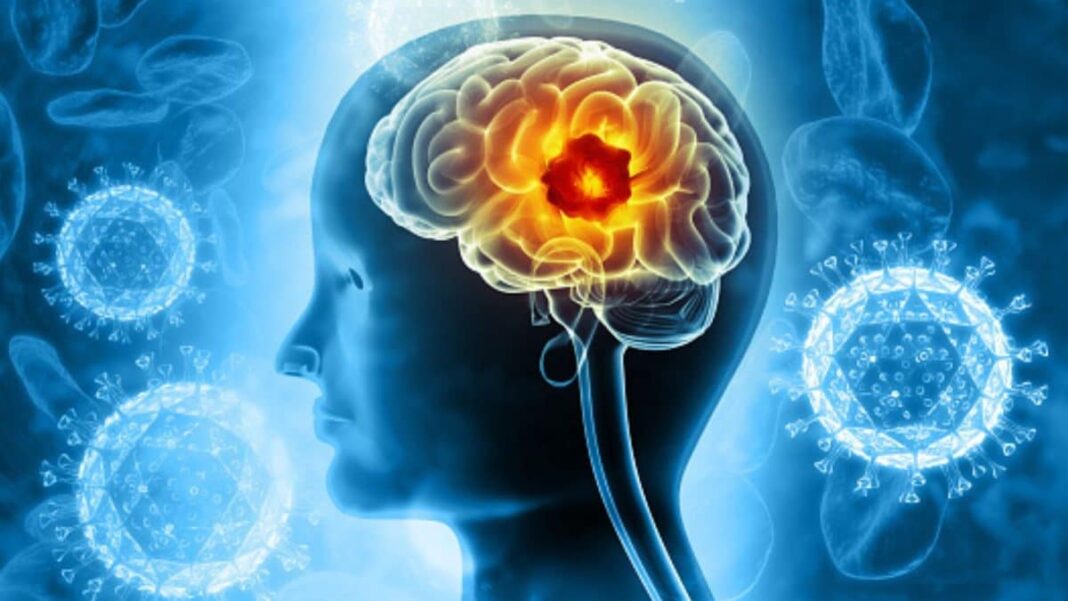Last Updated:
Unlike other organs, brain can’t feel pain. Most tumours grow quietly until they become large to press on surrounding tissue. Symptoms develop slowly, early warning signs are vague
A tumour inside the brain is not just a physical illness — it alters how a person thinks, behaves and feels. (Getty Images)
Nearly 28,000 cases of brain tumour are recorded every year, with about 24,000 individuals dying from it. These abnormal growths in or near the brain—some benign, others deadly—strike without warning, mimicking everyday ailments like migraines or fatigue.
As the International Brain Tumour Awareness Week kicks off from October 25 until November 1, let us understand what brain tumours are, what are their symptoms, and how they affect patients.
What Is A Brain Tumour And How Does it Form?
A brain tumour is an abnormal growth of cells inside the brain or around it. It can be benign (non-cancerous) or malignant (cancerous). But unlike tumours in many other parts of the body, even benign brain tumours are dangerous because the skull is a closed, rigid space. As a tumour enlarges, it increases pressure on the brain, disrupts the flow of cerebrospinal fluid, and compresses nerves and blood vessels.
Tumours may originate in the brain itself or spread from cancers elsewhere in the body, such as the lung, breast or skin. These are known as metastatic tumours and are more common in adults than primary brain tumours.
The biggest danger is not only uncontrolled growth but the tumour’s location. A pea-sized tumour in the brain stem can be more lethal than a larger one in a less critical area, because it interferes with breathing or heartbeat.
Why Brain Tumours Are Hard to Detect Early
Unlike other organs, the brain cannot feel pain. Most tumours grow quietly until they become large enough to press on surrounding tissue. Symptoms develop slowly, and early warning signs are vague, which is why many patients ignore them for months.
Common early signals include:
- Frequent morning headaches, often worsening over time
- Unexplained nausea, especially soon after waking up
- Gradual loss of vision or blurry vision
- Sudden imbalance, clumsiness or difficulty walking
- Behaviour or personality changes
- Speech difficulty — forgetting simple words, slurred speech, or slow responses
- Persistent fatigue or abnormal sleepiness
- Seizures in a person with no prior history
- One-sided weakness in the face, arms or legs
Families often misread these symptoms as migraine, stress, “weakness,” gastritis, or age-related slowdown. In children, early signs may look like irritability, developmental delay, or persistent vomiting.
The longer the delay in diagnosis, the more complicated the treatment becomes.
How Brain Tumours Affect Patients Mentally & Physically
A tumour inside the brain is not just a physical illness — it alters how a person thinks, behaves and feels. Depending on where it is located, patients may experience:
Frontal lobe: Personality changes, impulsiveness, poor judgment
Temporal lobe: Memory loss, emotional outbursts, seizures
Parietal lobe: Difficulty walking, poor coordination, confusion
Occipital lobe: Visual disturbances or blindness
Cerebellum: Vertigo, imbalance, slurred speech
Brain stem: Breathing issues, swallowing difficulty, coma
Families often struggle as much as patients because the person they love begins to behave like a different version of themselves. Mood swings and emotional instability are common due to disrupted neural pathways and steroid medication.
Are Brain Tumours Increasing Among Younger Adults?
Globally, doctors are observing more tumours being diagnosed in young and middle-aged adults. Better MRI access is one reason, but lifestyle patterns such as rising obesity, high exposure to radiation (including excessive CT scans), and sedentary habits are also being studied as long-term risk factors. Some tumours are linked to genetic mutations. However, for most patients, the exact cause remains unknown, which makes prevention difficult.
In India, increased life expectancy and better medical access are leading to higher detection numbers. Major cancer institutes in Mumbai, Delhi, Bengaluru and Chennai have reported growing caseloads over the past decade, especially in people between 35 and 60 years.
How Is A Brain Tumour Diagnosed?
Diagnosis begins with neurological examination, followed by scans. The current gold standard is MRI, which gives clear images of soft tissue. In certain cases, PET scans, functional MRI, or MR spectroscopy are used to map areas that control speech and movement, helping surgeons avoid damage.
A biopsy is the definitive step to confirm whether the tumour is benign or malignant. Modern surgical navigation systems now allow surgeons to remove tumours with significantly higher precision than two decades ago.
Why Is The Treatment Complicated & What Patients Can Expect
Brain tumour treatment is rarely straightforward. It is a long journey involving multiple specialists — neurosurgeons, oncologists, radiologists, physiotherapists and psychologists.
Treatment options include:
Surgery: To remove as much of the tumour as possible without damaging healthy tissue.
Radiation Therapy: To destroy remaining tumour cells or shrink inoperable tumours.
Chemotherapy & Targeted Drugs: Especially in aggressive cancers such as glioblastoma.
Rehabilitation: This includes speech therapy, physiotherapy and cognitive retraining.
Survival rates vary dramatically based on tumour type. Slow-growing benign tumours have positive outcomes after surgery. Aggressive tumours such as glioblastoma have poorer long-term survival, but new treatments like immunotherapy and CAR-T cell research offer hope for the next decade.
India has rapidly improved access to neuro-oncology, but affordability remains a major challenge. A full treatment cycle can cost several lakhs, especially in private hospitals. Government cancer centres offer lower-cost care, but waiting lists can delay treatment.
What Families Should Watch Out For
Awareness about brain tumours is the strongest defence. A person should seek medical evaluation if headaches are frequent and steadily increasing, pain worsens when lying down or early in the morning. There are unexplained seizures or repeated blackouts; behaviour, speech or memory changes suddenly; one side of the body feels weak or numb; vomiting occurs without stomach-related illness; vision suddenly becomes blurry or double.
Early detection gives the best chance of recovery.
How Is An Individual’s Life After Treatment?
Even after surgery and radiation, many patients face emotional and cognitive after-effects. Survivors commonly report:
Rehabilitation is not optional — it is as important as surgery itself. Families play a crucial role because emotional stability improves recovery outcomes.
How Brain Tumour Research Is Advancing
The future of treatment is shifting towards:
- Personalised medicine, based on genetic profiling of each tumour
- Immunotherapy, which trains the body’s own immune cells to attack cancer
- Improved imaging, allowing surgeons to see microscopic tumour cells
- Less invasive robotic surgery
- Early blood markers, which scientists hope will one day allow detection through a simple blood test
If these innovations become mainstream, early diagnosis and longer survival could become the norm rather than the exception.
What To Conclude
Brain tumours remain one of the toughest medical challenges of modern times, but awareness is the first shield. Recognising symptoms early, seeking timely medical help, and understanding the treatment journey can save lives and preserve quality of life.
While science has not yet found a cure for all tumour types, breakthroughs are accelerating — and for thousands of families, that progress is a reason to hold on to hope.
Shilpy Bisht, Deputy News Editor at News18, writes and edits national, world and business stories. She started off as a print journalist, and then transitioned to online, in her 12 years of experience. Her prev…Read More
Shilpy Bisht, Deputy News Editor at News18, writes and edits national, world and business stories. She started off as a print journalist, and then transitioned to online, in her 12 years of experience. Her prev… Read More
October 27, 2025, 15:08 IST
Stay Ahead, Read Faster
Scan the QR code to download the News18 app and enjoy a seamless news experience anytime, anywhere.

login



